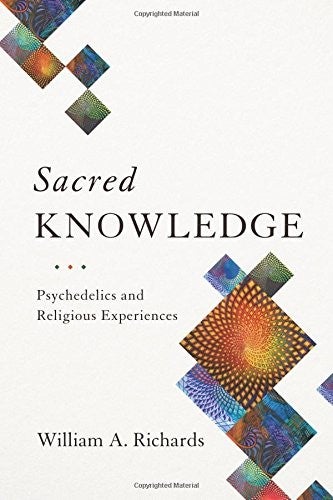William A Richards, Sacred Knowledge: 'Turn on, tune in, see God', book review
'Sacred Knowledge' charts the birth, death, and resurrection of psychedelic research

Your support helps us to tell the story
From reproductive rights to climate change to Big Tech, The Independent is on the ground when the story is developing. Whether it's investigating the financials of Elon Musk's pro-Trump PAC or producing our latest documentary, 'The A Word', which shines a light on the American women fighting for reproductive rights, we know how important it is to parse out the facts from the messaging.
At such a critical moment in US history, we need reporters on the ground. Your donation allows us to keep sending journalists to speak to both sides of the story.
The Independent is trusted by Americans across the entire political spectrum. And unlike many other quality news outlets, we choose not to lock Americans out of our reporting and analysis with paywalls. We believe quality journalism should be available to everyone, paid for by those who can afford it.
Your support makes all the difference.On 4 December 1963, at Göttingen University, a 23-year-old William Richards was voluntarily injected with liquid psilocybin – the active ingredient in magic mushrooms – and left in a basement lab.
He died; he was reborn; the wonders of the Universe danced before his very eyes. “‘Awe’, ‘glory’, and ‘gratitude’ were,” he writes, “the only words that remained relevant.”
The experience sparked an obsession and eventually a vocation: how can human beings access “the eternal brilliance of mystical consciousness”? And what the hell does that even mean anyway?
Part memoir, part manifesto, Sacred Knowledge charts the birth, death, and resurrection of psychedelic research.
Having witnessed the subject’s infancy – in the early 1960s researchers could simply send off for LSD by mail order – Richards had the “dubious distinction” of ushering in its end. In 1977, at the Maryland Psychiatric Research Centre, he administered the final dose of psilocybin in the last legal study, before, in what Professor David Nutt has called the “worst case of censorship since the Catholic Church banned the works of Galileo”, he and his fellow researchers were put out of the job for more than two decades.
In 1999, when the thaw finally began, Richards led the revival. The results of the first study – a comparison of the effects of psilocybin with Ritalin – were staggering. A third of those who received psilocybin rated their experience as “the most spiritually significant of their lives”.
Crucially, 14 months down the line, the subjects had made “enduring positive life changes”. They were generally more creative, compassionate, and at peace with those around them. One research participant ended up resigning from his job in weapon design and became a Zen monk; another ran off with the Peace Corps. No wonder governments had tried to stop it.
A flash of light on the road to Damascus; a burning bush on Mount Horeb: hallucinations and revelations have long been man’s guide. By studying psychedelics – Richards prefers the term “entheogens”, substances that “generate God within” – the benefits of such experiences can be scientifically shown.
Subjects suffering from depression, addiction, and even cancer have all gained from a brush with the divine. Never mind vitamins. The conclusion to be drawn from this book is that it’s time – in a safe setting and with careful guidance – that we started taking our miracles in tablet form.
Sacred Knowledge, by William A Richards. Columbia university press £19.95
Join our commenting forum
Join thought-provoking conversations, follow other Independent readers and see their replies
Comments